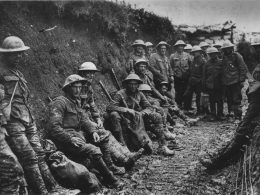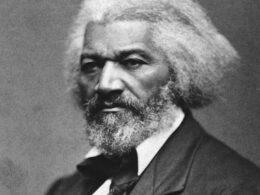Condemnation of Leon Trotsky is well-trodden ground for so-called biographer Robert Service. Service was condemned by The American Historical Review (June 2011), which considered his ‘biography’ of Trotsky a complete distortion.
Here socialistparty.net reviews Service’s latest offering, ‘Spies & Commissars’, in which the skulduggery of British spies like Sidney Reilly is used to spice up the same old false picture of the Bolshevik regime which followed the Russian revolution of 1917 – particularly of its leaders, Lenin and Trotsky.
Service writes in the introduction to this heavy tome: “Lenin and Trotsky… were convinced that Europe was on the threshold of communist revolution and that it needed only a slight nudge from them to make all this happen.”
It did not need a “slight nudge” but the workers of Europe needed to emulate their Russian brothers and sisters and take power out of the hands of the capitalists who, through the bloody carnage of World War One, had ruined Europe.
The Bolsheviks, by declaring a unilateral peace, began the process of ending the war. As to the international effect of the Russian Revolution, Service himself comments that “the Labour Party held a celebration of the revolutionary events at the Albert Hall. 10,000 people attended and Ramsay MacDonald [then Labour leader] was the main speaker…
“It was an occasion that nobody present would forget. The Romanovs were gone and freedom had arrived in Russia. There was talk of a brotherhood of the Russians and the British no longer poisoned by the existence of tsarist despotism.” This was just one expression of the colossal enthusiasm and sympathy that the Russian revolution generated.
Independent organisations
Lenin is described as a “killjoy” during his return to Russia in February 1917 and “less than gracious to the Mensheviks and Socialist-Revolutionaries” because he told the truth. He correctly called on the working class to place no trust in the coalition government involving some workers’ leaders – the Mensheviks and Socialist-Revolutionaries – with the ‘liberal’ capitalists.
Marxists adopt the same position today in placing no trust in the governments which have arisen on the backs of the revolution in Tunisia or Egypt. Instead, we call on the masses to build their own independent organisations if they are to make a ‘second revolution’, a social revolution, which is the only way to satisfy their demands and consolidate the revolution.
Childishly, Service describes Trotsky and Lenin as “exceptional troublemakers”. As if a revolution – demanding an understanding of the process of revolution at each stage and the political slogans and action which flow from this – could be led by mere “troublemakers”!
Yet Service allows himself to admit that, in the words of one observer, “Lenin and Trotsky are merely the spokesmen of the workers.”
Revolutionary wave
He is compelled to recognise that the Bolsheviks reflected in October 1917 the real mood of the masses. “Raymond Robins of the American Red Cross… concluded that the war was dead ‘In the heart of the Russian soldier’. “
The Bolsheviks triumphed because they were the only party, in reality, who were prepared to end the war, cancel all tsarist debts as well as the secret treaties of the tsarist regime, give “bread and freedom” and proclaim that Russia had initiated a new era of the socialist revolution. In so doing, they evoked a tremendous movement of the masses in Europe, which battered at the foundations of capitalism.
No, says Service, who states: “Much though Bolshevik doctrine pretended to scientific status, it was in fact rooted in blind faith and the Russian revolutionary tradition.” But Lenin and Trotsky were proved right. The Russian revolution initiated – with some delay – a revolutionary wave which swept through Europe.
Despite the author’s attempt to prove the opposite, the Bolsheviks almost succeeded, especially in 1919, a tumultuous year of revolution and counter revolution. It was the cowardly social-democratic parties, especially in Germany, that saved capitalism through a ‘counter-revolution’ in a democratic form – which meant that the trappings of parliamentary democracy were maintained.
But at the same time the most brutal methods, for instance in the Ruhr Civil War, were carried through to suppress the revolution. There was nothing ‘utopian’ in Lenin and Trotsky’s expectation that Russia was the spark that would begin the European revolution.
By using their approach, we were able to foresee the outbreak of revolution in Egypt (see the CWI World Congress document on ‘World Relations’, November 2010).
Look at the ‘contagious’ effects of the Tunisian and Egyptian revolutions today; just like in Russia in 1917! They have had a worldwide effect, leaping from one country and from one continent to another, even resounding powerfully in the consciousness of the American working class, for instance in Wisconsin with the flying of the Egyptian flag.
The spies
British spy Reilly plotted Trotsky’s assassination at the 1918 May Day celebrations in Moscow: “This is just the moment to kill Trotsky and liquidate Bolshevism!” As if the assassination of individuals – even one as prominent and important as Lenin or Trotsky, which admittedly would have been a grievous loss – would have been sufficient to eliminate the social basis upon which they rested!
The methods of terrorism are as ineffective when applied to a workers’ state as they are under capitalism. A ruling class, or workers’ force like the Bolsheviks in Russia, is ultimately capable of replacing from its ranks those who fall under the assassin’s bullet.
Service’s subplot of British spies, and the inevitable gossip surrounding them, reads more like a cheap detective novel than a serious historical account. Reilly and his cohorts behaving childishly and usually unsuccessfully. That is not to say that they and their masters were not vicious in their intent.
For instance, Winston Churchill, an inveterate opponent of Bolshevism, declared on 28 November 1918: “Russia is being reduced by the Bolsheviks to an animal form of Barbarism… Civilisation is being extinguished over gigantic areas, while Bolsheviks hop and caper like troupes of ferocious baboons amid the ruins of their cities and the corpses of their victims.”
Over the war with Poland, for instance – which Service goes into at some length – it was the refusal of the London dockers to load ammunition and troops on the ship Jolly George which indicated the huge opposition that existed to British intervention.
The Labour Party itself was compelled to organise a ‘council of action’, an embryonic form of soviet rule, in opposition to the use of the Polish war as intervention against the Russian Revolution.
Service mentions this and similar examples – such as the revolt of the French troops intervening in Russia – but he refuses to draw all the conclusions because they would violate his arguments that the Russian revolution could have been defeated if the “Allies” had acted with sufficient resolution and in a coordinated manner.
The Times newspaper 60 years later was more accurate when commenting about Saddam Hussein’s attack on Iran: “Never invade a revolution”.
The fact that the ‘Allies’ did not successfully intervene was not an accident. The European continent was in chaos, with the ruling classes besieged by revolution and counter-revolution. Lenin and Trotsky manoeuvred very skilfully between the different imperialist powers in order to gain ‘breathing space’ and allow the European revolution to mature.
None of this Service is capable of understanding. This is shown when he writes: “The spread of communism that had been the dream of Lenin and Trotsky was fulfilled as Stalin communized the entire eastern half of Europe.”
Stalinism
A river of blood separates the democratic workers’ state associated with Bolshevism and the bureaucratic dictatorial regime of Stalin. The whole purpose of Service’s book and a small army of historians like him is to associate genuine Bolshevism with the lack of democracy, rule by a greedy bureaucracy, etc, summed up by Stalinism.
If Stalinism and Bolshevism were twins, why then was it necessary for Stalin to wipe out the remnants of the Bolsheviks in the 1930s purge trials? Because, among other things, the Spanish revolution threatened to reignite a political revolution against the bureaucracy.
Lenin and Trotsky called for action by the European workers themselves to join the Russian workers in a great confederation of socialist states, organised on democratic lines.
Stalin, on the other hand, presided over the extension of the planned economy of Russia to Eastern Europe, but from the beginning these states were dominated by a greedy, totalitarian bureaucratic caste which had nothing in common with the origins of Bolshevism.
This book reveals nothing new and covers the same perversion of historical truth as Service’s earlier books. Service writes on behalf of the ruling classes who, 95 years after it took place, still fear the revolution and its lessons for today.
We, for our part, will do everything to inform the new generation about the real lessons of the 1917 Russian Revolution, still the single greatest event in human history.












